The GS score in the Prelims is the most important variable to qualify to the next round of the IAS exam- mains exam.
The GS score in the mains exam accounts for 3 separate papers out of which determines the qualification for the interview and your overall rank at the end of the examination process.
There is considerable overlap between the syllabus of the UPSC for general Studies in Prelims and Mains but it is often unclear how to prepare and what to focus on .
General Studies is vast and seems to cover everything under the sun but is just as vastly important to your success in the examination.
You can read about the hidden messages in the UPSC syllabus here.
GS score booster cheat sheet contains powerful strategies, insights and ways to amplify your GS score you can-
- Prepare for Prelims, Mains and Interview all at once such that your time and effort are used optimally.
- Conceptual clarity and factual knowledge are gained simultaneously.
- Revision is reduced to glancing and does not require mammoth amounts of effort where you practically must re-learn the entire syllabus.
- Learning becomes easier as inter-connections develop across disciplines and ‘current events’ are integrated in your preparation organically as genuine interest develops.
To begin, lets look at the syllabus of GS from the official notification of UPSC, 2020.
Syllabus of UPSC for GS
For ease of reference, I have compressed the entire GS syllabus for the IAS exam into one page which you can download or Ctrl+S to save.
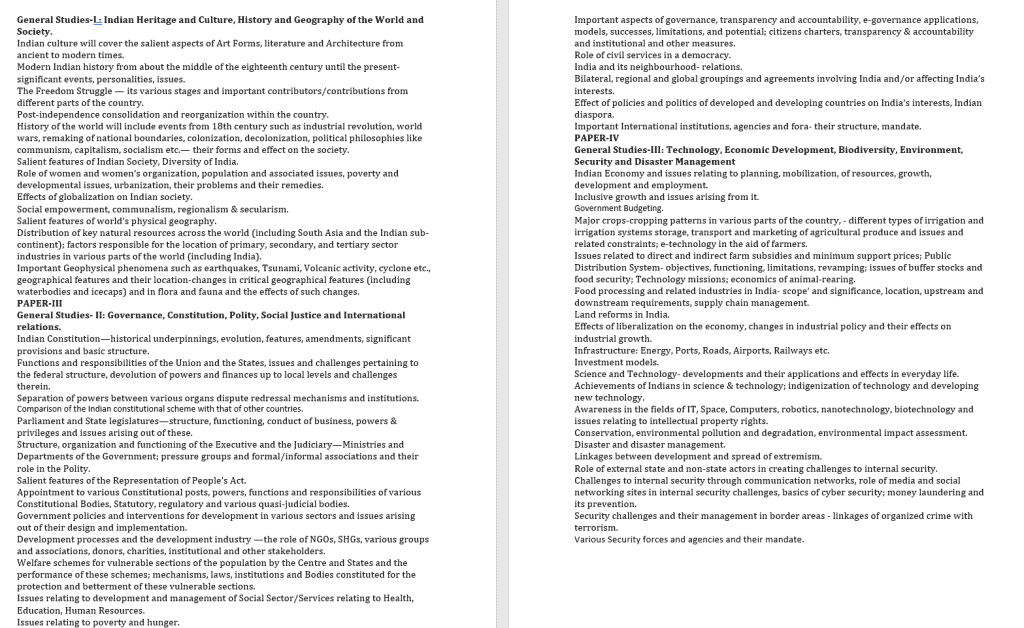
I recommend keeping the image of UPSC syllabus in front of your desk all throughout your UPSC preparation journey or perhaps setting it up as the background Wallpaper for your Computer or Phone.
This will not only serve as a constant reminder but also help you keep track of progress as you strike-off topics one by one.
It seems that from history to Geography, the UPSC syllabus for General Studies covers many unrelated topics. The exhaustive list of topics doesn’t do much expect intimidate anyone who realizes that they have to learn and be tested on all of this.
Is there a hidden pattern? Can all of it be simplified?
GS syllabus super-simplified
Remember that this examination, first and foremost, is about India. The job which you seek, the place where you will perform your duties and your future employer are all broadly speaking, India.
How does this help you in increasing your GS score?
The UPSC syllabus can be re-arranged to reveal a hidden symmetry which clarifies many things and enhance your GS score.
ALL topics in the UPSC syllabus fall into one of the 4 categories listed below-
- India’s Context: The things in the wider world which effect India directly or indirectly.
- India’s Past: Historical events which shaped India into what it is today.
- India’s present: Where things stand in India now.
- India’s future: The challenges which India faces, efforts and potential remedies.
This classification goes beyond current and static portions. It also cuts across many disciplines. You no longer need to see the UPSC syllabus as having to cover geography or Polity.
A closer look reveals that General Studies is deeply inter-connected and there is a method to the madness.
INDIA’S CONTEXT
As part of the human story, India is embedded in a context. Historically , geographically and economically- events in the world have impacted India and continue to do so.
It is not possible to appreciate the complexity or the challenges of a country like India without knowing the origins of the story. And the origin-story of India is inevitably tied to the rest of the world.
History of the world
This section contains world-changing events over the past two centuries. The reason they are included in the syllabus because you can not appreciate the way the world is today, without understanding the reasons which led to the current situation.
You must know about the American revolution and the World Wars because these events changed the world dramatically and by definition, India as well.
This may sound obvious and trivial but it isn’t.
You can trace the relevance of all the topics under this section to India, for instance- the French Revolution is where the political ideals of liberty and equality took formal shape.

These ideals inspired the values of the Indian Freedom struggle continued to shape the Constitution of India including the Fundamental Rights which you enjoy today.
Recent judgement of the Supreme court surrounding Article 19-21 and the current raging debate about tolerance in India can be traced to these ideals. Likewise, the issue of Data-privacy and the recently drafted Data- privacy bill, 2019 are manifestations of their central importance.
Notice how the French Revolution is connected to Polity, Science-tech, Ethics AND current events?
World’s physical geography
Topics in this section effect everyone regardless of nationality, gender or Political affiliation.
It is intersting to learn about earthquakes, Cyclones, droughts, volcanoes in it’s own right but more so, when you can connect to India even when it is not explicitly mentioned.
Take for example, the topic of Plate tectonics and continental drift.
It is fascinating that the Earth’s crust undergoes cyclic transformation like everything in nature but even more fascinating to know that the Great Himalayas are the result of a collision between the Eurasian and Indian plates millions of years ago.

Interestingly, the collision is ongoing to this day with the Himalayas gaining height bit by bit every year.
One spin-off result of the collision is also that there is tremendous build-up of pressure underground which makes Northern India a seismically active region. Meaning that a massive Earthquake may be overdue since a very long time.
If you live in or near Delhi, you would have paid close attention to the recent series of mini-earthquakes near Delhi, possibly thinking about the incredible power of nature over which we have no control.
Which automatically directs your thoughts towards disaster management and Earthquake predictions- another important aspect of General Studies syllabus.
The point is that there is a connection leading from Plate tectonics to you and India.
If you can trace that connection back to you, that topic will forever be interesting and you will not miss a chance to boost your GS score marks when questions are asked about it.
Climate Change and Environment
Needless to say, Climate effects everyone. An El Nino phenomenon in one part causes droughts and calamity in another part of the world.
There will be dire consequences for everyone due to global warming and the melting of the icecaps. But probably more so For India because as a tropical country as well as a developing one.

Alongside, there is a sad human drama unfolding before your very eyes with the world largely ignoring the obvious risks associated with climate change.
As part of this human drama, efforts like the United Nations Framework Convention on Climate Change UNFCCC try to bring countries together with little success.
Connect some points in your essays and answers in the Mains exam to Environmental concerns and watch your gs score skyrocket.
World Economy
In this section, you will learn about Macroeconomics which is the study of how Economies function one a large scale.
Inflation, GDP, employment, debt are all related concepts which are used to diagnose the health of an economy.
How do governments try to control the fluctuations of an ever-changing economic machine? The devices at their disposal to do so are categorized as monetary and Fiscal Policy which you will learn under the rubric of Macroeconomics.
Distribution of key natural resources across the world and globalization has made the world deeply inter-dependent.
Which means that the topics in this section are intimately connected to India and therefore, it is important to know how Economies work and effect each other. Why do prices rise in one country if another faces a banking crisis?
This section is critical to the IAS exam with multiple questions each year in Prelims and Mains. This is not a coincidence but reflects the enormous relevance and influence of Economic matters for everyone including India. When approached this way, this section has the potential to multiply your gs score.
General Science and Technologies
Science and tech is essentially about the pivotal discoveries in science and their corresponding application in the world.
Luckily, the UPSC makes it very clear that ony general knowledge of foundational concepts is needed.
For example, consider Information Technology which makes communication between mobile phones possible. While You will not be asked what Maxwell’s equations for the electromagnetic force is, you should know that electricity and magnetism are the same force and your smartphone uses this extensively.
Einstein’s theory of relativity said that space and time are interwoven as a space-time fabric. Gravity is actually the bending of this fabric due to massive objects like stars and planets, causing lighter objects to be drawn towards themselves. This ‘pull’ is experienced as gravity.

It was hypothesized that If the fabric of space-time can be bend, then this should create shock-waves which should ripple across the fabric like waves in an ocean. These ‘gravitational waves’ have recently been detected and provide further proof that Einstein’s theory is correct.
This is why the recent discovery of gravitational waves is a landmark in the history of Science.
No wonder there was a question about this in the UPSC prelims in the previous year.
It follows that if the fabric of space time is carrying a very very heavy object like a black hole, it will bend the fabric beyond normal limits. Near a black hole, the bending can be so steep and gravity so strong that even light cannot escape the pull.
A photograph is a capture of the light being emitted by an object. And since black holes do not emit any light, there can never be an image of a black hole. Yet, scientists recently captured the first-ever image of a black hole.

This was big news in scientific circles and was asked in one of the questions in the Prelims last year.
The Coronovirus pandemic has put the importance of Science at the center stage. You only need basic knowledge about these ideas which can easily be learned on Youtube.
Approaching these topics with curiosity is a sure shot way to increase your GS score and to keep things interesting during preparation for the IAS exam.
INDIA’S PAST
Instead of focusing on the larger world, this portion deals directly with events which occurred in the Indian subcontinent. But the theme of relevance remains very much alive in this section as well.
Indian culture and history
India is the birthplace of many civilizations and religions since millennia. Which means that there have been periods of vast changes- each one with it’s unique features.
Our inherited culture is the amalgamation of the features which have survived – from Ancient to Modern times.
Medieval India is about the changes that the Indian subcontinent went through and the situation which led to the British colonizing India.
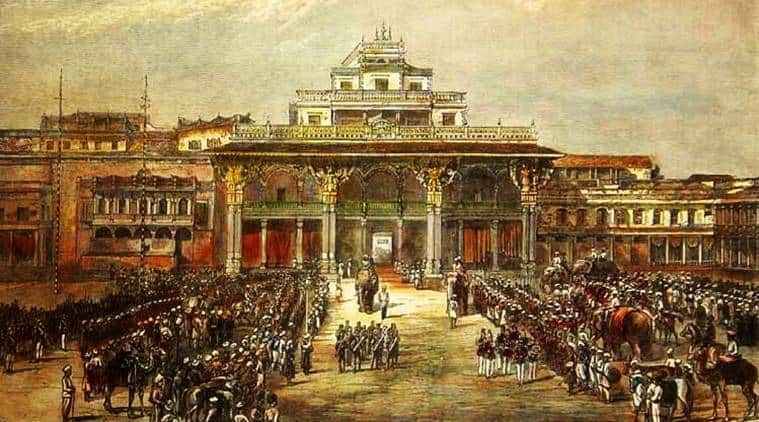
Modern India tells you the story of how India became the country it is today.
One example is of Raja Ram Mohan Roy who was an important person not just because he is mentioned in the NCERT books but because of the things he accomplished- one of them being abolishing the practice of Sati.
The reason you should care about this is that the UPSC cares about it as well.
Gender equality is a burning issue in the country and will continue to remain as such for the foreseeable future. To illustrate how seriously the Indian government regards this aspect one just needs to flip through ANY page of the UPSC official notification to find this at the bottom of EVERY page.

People like RRMRoy and others were the among the first generation of Modern Indians to start efforts towards the upliftment of women in India- efforts which continue to this day.
They all fought for issues which became foundational values of independent India. The same line of thinking can be used to understand all important characters in Modern Indian History from Swami Vivekananda to Sri Aurubindo etc.
This is a good example of how History leads into Polity which leads into current debates of economic and social nature.
History and culture is not a tedious list of topics to go through. It is expedient to know a little but about the history and culture of the country you wish to serve if you want to boost your GS score.
Questions about the Culture and History of India are not only to test your knowledge, but also to test for an appreciation of the vast diversity of our country.
INDIA’S PRESENT
This section contains what is otherwise called the ‘Static portion’ of GS. It includes the factual status of things as they stand in present times. Topics include demographics, Geographical features, flora, fauna, economic infrastructure – Ports, Railways, Post etc
Indian polity and governance is extremely important and carries a lot of weight-age in the exam. Think about Polity as getting to know your future employer.
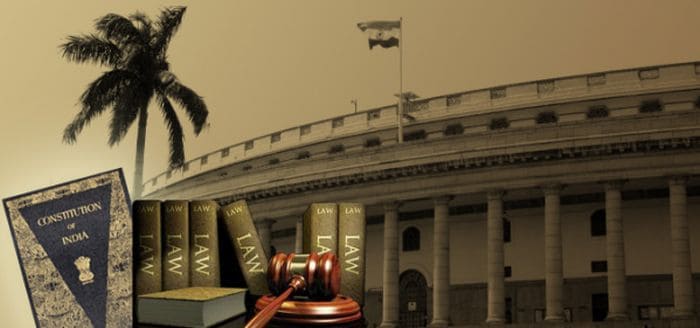
If you wanted to work for a specific company, you would go to their website and understand the organisational setup and get to know the company a little bit.
Why not do the same with your future employer- the Government of India?
Technically speaking, as a civil servant, your boss is the President of India, but who elects or selects the President? Topics like these are covered in Indian Polity.
Your challenge will be what NOT to read rather than what to read because there virtually an unlimited amount of information out there about this section.
INDIA’S FUTURE
Challenges, Efforts and Potential solutions
This is the largest and most overlooked aspect in the syllabus of upsc for increasing your GS Score. Understand that as a developing country, India has a lot of challenges to overcome. You are being recruited based on your fitness to handle those challenges.
Again, the UPSC is explicit about this-

The clues are all over the UPSC syllabus – More than 50% of the syllabus talks about different challenges. In fact most questions in the Mains and Interview ask you to directly address one challenge or the other.
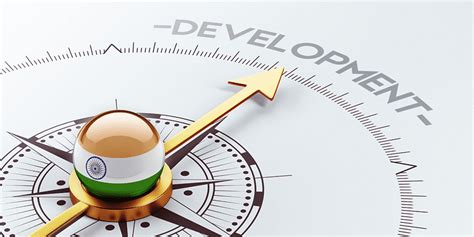
The overarching goal for India is Inclusive and sustainable Growth, which contains many sub-goals such as –
- Challenges of Education: How to educate a traditionally agricultural country of billions, with dozens of different languages in use and a historically under-educated populace?
- Health care : How to provide quality health care to billions of people while most cannot afford to pay for private healthcare?
- Security: How to maintain internal security in a country as diverse as India where separatist sentiments are perpetually brewing in one part or another. How to maintain external security as a nation in a volatile subcontinent?
- Environmental preservation : With economic and industrial growth comes resource depletion and environmental degradation. How to balance both simultaneously?
- Changes due to Global warming and Climate change: As a tropical country with a large vulnerable population, how to prepare and safeguard against the effects of Climate change?
- Weaker section protection and empowerment: Large sections of Indian society were marginalized historically. How to push these sections up to par in terms of opportunity and prosperity, while remaining equitable and fair?
- Economic Growth and Employment: How to keep the economic engine churning jobs and high output while balancing Private Business interests with social causes?
This list is not exhaustive but if you notice carefully you will see that all of these are clearly mentioned in the UPSC syllabus.
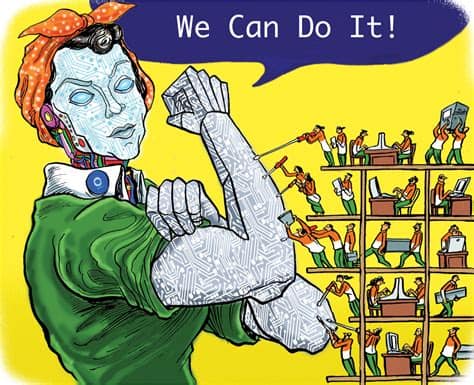
These goals are, in a way, the syllabus FOR any Indian Government – your future employer which is why these goals are in the UPSC syllabus as well.
The broad goals of the Government of India (regardless of political party) are formally enshrined in the Constitution of India. They are most explicitly mentioned under the ‘Directive Principles of State Policy’.
How are these challenges to be met? Through the Executive Branch of the Government which is structured into separate ministries.
Notice how closely almost each one of these challenges or goals corresponds to a different ministry of the Government.
There is an uncanny overlap between the DPSP, list of ministries and the UPSC syllabus- it is almost as if the same list of challenges is written in different words in all three places.
Try going directly to the official websites of separate ministries and read the articles and reports they publish. You will increase your GS score much more, than by reading endless notes and books.
How to boost GS score across the board?
To increase your GS score beyond your expectations, use the ‘4Y’ technique-
- Why is this topic important enough to be in the syllabus?
- Why is this topic important for India ?
- How could this topic have impacted me in my life?
- What is happening in recent times surrounding this topic?
Ask these questions before you begin preparing EVERY topic and observe your knowledge network grow exponentially.
CONCLUSION
In reality there are no demarcations between ‘subjects. Reality poses complex challenges and your job is to understand and navigate those challenges.
The ‘General’ in General Studies stands for the fact that knowledge is inter-connected and cross-disciplinary. Especially in the IAS exam where the focus is on the real world and strict academic divisions can be ignored.
Your success in the IAS exam depends on how rich and inter-connected our map of the world is- with primary focus on India- the country you wish to serve,
General studies is about India. Even the topics which do not explicitly mention it. It can be divided into 4 broad parts as listed above.
If you haven’t done it already, you should take the UPSC syllabus challenge detailed here.
You can Clear the IAS exam WITHOUT coaching institutes AND while continuing your job. An in-depth analysis can be found here.
I hope this article has answered some of your doubts and that you found it useful.
Let me know your thoughts in the comments below.
Tc and all the best!
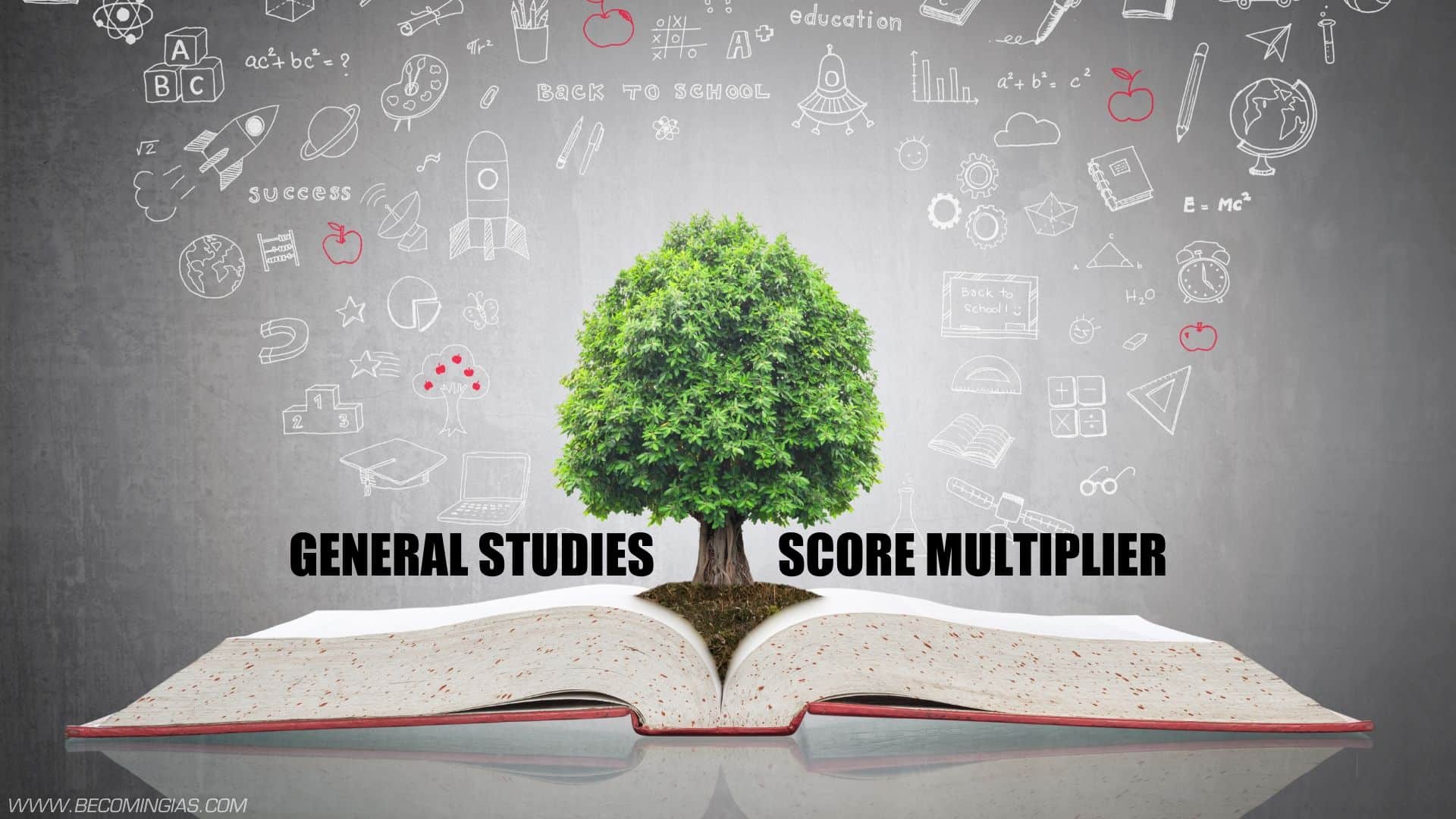
Loved the insights in this article! For those navigating the complexities of online learning, getting the right support can make a big difference. If you need online classes help to keep up with your coursework, this service could be a valuable resource.
cleared some doubts
thank u so much sir
Thank you so much, It is a much needed booster.
Really amazing and appreciating
I love looking through a post that can make people think. Also, many thanks for permitting me to comment!
Good one! Interesting article over here. It’s pretty worth enough for me.
A big thank you for your article.
I learn something new and challenging on blogs I stumbleupon everyday.
Like!! I blog quite often and I genuinely thank you for your information. The article has truly peaked my interest.